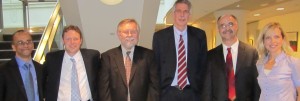Founded in 2010 as a response to a call to use “citizen participation, collaboration and expert analysis to inform and improve decision-making on issues involving science and technology”, ECAST is a collaboration among university, informal science education, and policy research partners to establish a non-partisan, independent, flexible, and proactive technology assessment capability in the United States. ECAST engages experts, stakeholders representing diverse perspectives and everyday citizens in assessing the responsible design and use of emerging developments in science and technology through a mix of formal and informal methods. Working with partners in government, industry, academic, and non-governmental settings, as well as with experienced colleagues in other nations, ECAST will conduct innovative, inclusive, and participatory assessment activities in a transparent and democratic fashion on a range of scientific and technological issues, and will broadly share and disseminate the results with policymakers, media, and the general public.

The Expert and Citizen Assessment of Science and Technology (ECAST) network is a distributed network of institutions that creates peer-to-peer public deliberations to inform citizens about and solicit their input to science and technology policy issues, in an effort to more fully inform policymaking. Such peer-to-peer methods are designed to enable participants to distill their own questions and share feedback so that policymakers may better understand and take into account a broader understanding of the societal implications of emerging developments in science and technology. The ECAST network brings together academic research, informal science education, citizen science programs and non-partisan policy analysis to engage citizens on decision-making related to science and technology policy. ECAST’s founding membership are: Consortium for Science, Policy and Outcomes, Arizona State University; the Museum of Science, Boston; SciStarter.org and Science Cheerleader; the Loka Institute; and, the Science and Technology Innovation Program, Woodrow Wilson International Center for Scholars.
ECAST was formally introduced in April of 2010 through a briefing event at the Woodrow Wilson International Center for Scholars. The event marked the release of a report by Richard Sclove, “Reinventing Technology Assessment: A 21st Century Model.” It generated broad interest and was attended by representatives from the White House, Congress, and other governing bodies.
Following the report, ECAST continued to explore different approaches for participatory TA and, in 2012, the network undertook and completed its first large-scale demonstration project, the coordination of the U.S. component of the World Wide Views on Biodiversity (WWViews). This global citizen consultation – organized by the Danish Board of Technology and conducted in 25 countries and four US cities (Boston, Washington, Denver and Phoenix) on September 15, 2012 – provided input to the Eleventh Council of Parties of the UN Convention on Biological Diversity (CBD) that took place the following month. In December, ECAST released its project report, “Technology Assessment and Public Participation: From TA to pTA” through a follow–up event at the Wilson Center. The report examines the process and results of WWViews as a means of understanding the challenges and opportunities for expanding the practice of pTA in the U.S.
ECAST continues to seek opportunities to inform policymakers and punctuate citizen science efforts by creating an on-ramp for citizens to articulate and share their views with decision makers.